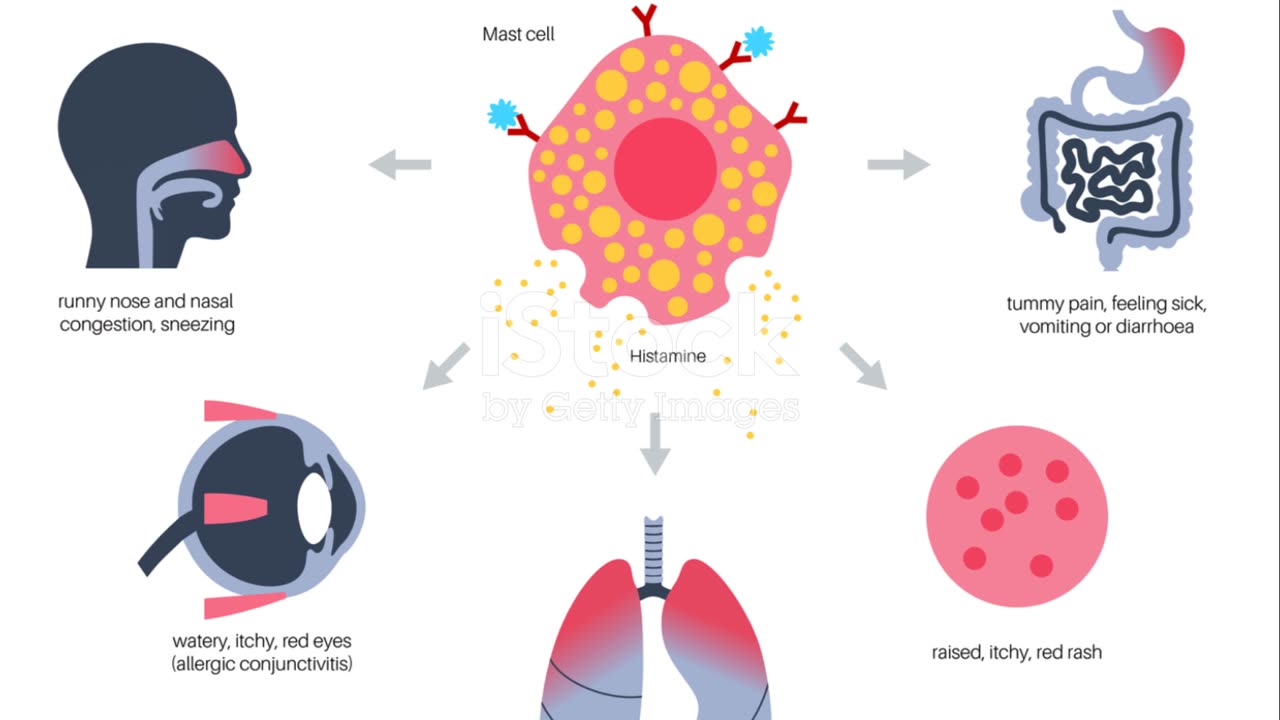Premium Only Content

Allergies Uncovered ; Your Body's Overreaction
Allergies occur when your body responds to a foreign protein. In some cases, these proteins, known as allergens, are innocuous. But if you're allergic to a specific protein, your body's immune system reacts excessively when it encounters this substance within your body.
Allergic reaction :
An allergic response is your body's defense against an allergen.
In the case of allergies, when you are exposed to a specific allergen for the first time, your body initiates a response by generating immunoglobulin E (IgE). The immune system produces these antibodies to create IgE.
IgE antibodies then adhere to mast cells, which are sometimes referred to as allergy cells, distributed in your skin, respiratory passages (airways), and the mucous lining of the interconnected organs spanning from your mouth to your anus, known as the gastrointestinal (GI) tract. This interaction triggers the release of histamine by the allergy cells. Histamine is responsible for allergy symptoms.
Causes and symptoms of Allergy:
The most common allergies include:
Certain foods
Common symptoms encompass:
Generalized itching all over the body (generalized pruritus).
Localized itching in a specific area of your body (localized pruritus).
Nausea and vomiting.
Swelling, including areas around your mouth, throat, tongue, or face.
In cases of IgE-mediated food allergies, anaphylaxis may also occur,
For adults, the most prevalent food allergies include Milk, Eggs, Wheat., Soy, Peanuts, nuts, Shellfish.
Inhalants ; Inhalant allergy symptoms include:
Runny nose.
Stuffy nose.
Itchy nose.
Sneezing.
Itchy eyes.
Watery eyes
Perennial allergens encompass: pets, dust mites, cockroaches, molds
Latex ; The primary response to latex exposure is skin irritation, known as contact dermatitis.
Medications like Antibiotics, nonsteroidal antinflamatory agents(NSAIDs), Insulin
Chemotherapy drugs.
Diagnosis: There are various methods of diagnostic allergy testing: skin prick test, intradermal test, specific IgE level, patch testing .
Management; Avoiding allergens is an important treatment approach but its difficult so use medication sometimes is the only hope.
Antihistamine; Fexofenadine, Loratadine, cetirizine.
Nasal sprays; Fluticasone, Cromolyn sodium, Antihistamine nasal sprays.
Decongestants; Oxymetazoline, Phenylephrine, Pseudoephedrine.
Allergen immunotherapy, such as allergy shots and sublingual immunotherapy
Precautions includes Read labels, Educate friends, family, Wear medical ID, Regular check-ups.
To read more visit site ... https://healthheal.net/allergy-how-to-deal-with-it/
-
 4:17:07
4:17:07
vivafrei
4 hours agoELECTIONS CANADA RESULTS LIVE STREAM WITH VIVA COMMENTARY!!!
94.3K98 -
 2:39:37
2:39:37
TimcastIRL
5 hours agoDemocrat LAUNCHES IMPEACHMENT Against Trump Citing Deportation, Abrego Garcia Case | Timcast IRL
131K120 -
 2:17:27
2:17:27
IcyFPS
3 hours agoA new legend rises.. Icy vs Teardrop | @playoffthegrid | Team MERC Grind |
9.05K2 -
 LIVE
LIVE
TwinGatz
5 hours ago🔴LIVE - Endless Jank | Oblivion Remastered
82 watching -
 1:33:55
1:33:55
Glenn Greenwald
10 hours agoGaza Starves, Pro-Israel Propagandists Escalate Extremist Rhetoric and Actions | System Update #444
124K273 -
 LIVE
LIVE
EnDuEnDo
4 hours ago🚨Variety Stream 🎮 Push to 500 Followers 🚀 Chill Vibes 😎
87 watching -
 11:04:48
11:04:48
GrimmHollywood
12 hours ago🔴LIVE • GRIMM HOLLYWOOD • SHADOW OF THE ERDTREE FIRST PLAYTHROUGH • PART 1
56.2K3 -
 1:40:13
1:40:13
megimu32
6 hours agoON THE SUBJECT: This Timeline is Broken: Epstein, Aliens & Summer Anthems
44.3K18 -
 1:02:42
1:02:42
Donald Trump Jr.
11 hours agoMAHA Means Business, Interview with Calley Means | TRIGGERED Ep.237
147K57 -
 1:53:52
1:53:52
Joker Effect
3 hours agoWhy aren't you trying to enjoy yourself? Live a little! https://go.mother.land/joker
36K1